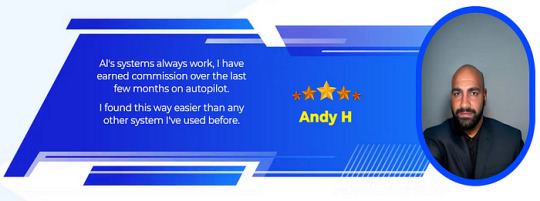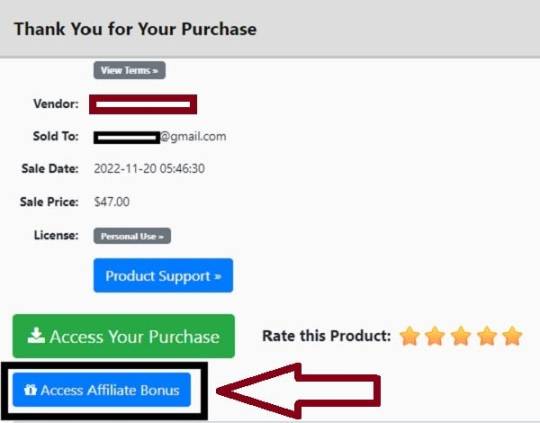#BioBucks Works
Text
BioBucks Review – Automated Cash Machine Social Media
Welcome to my BioBucks Review Post. This is a real user-based BioBucks Review Review where I will focus on the features, upgrades, demo, pricing and bonus how BioBucks Review can help you, and my opinion. This is the world’s first AI app that turns any bio section into a cash Machine Allowing Us To Profit $653.65 Daily With Zero Followers With Zero Ads.

<< Click Here to Get BioBucks + My $29000 Special Bonus Bundle to Boost Up Your Earnings More Traffic, Leads & Commissions >>
BioBucks Review: What Is It?

BioBucks Review: Overview
Creator: Al Cheeseman
Product: BioBucks
Date Of Launch: 2024-Jan-21
Time Of Launch: 10:00 EST
Front-End Price: $17
Official Website: Click Here
Product Type: Software (Online)
Support: Effective Response
Discount : Get The Best Discount Right Now!
Recommended: Highly Recommended
Skill Level Required: All Levels
Refund: YES, 90 Days Money-Back Guarantee
BioBucks Review: Key Features
Make Over $2,000 A Day From This Exact Same System
Instantly Tap Into Lucrative Paydays Without Knowing Anything At All.
ZERO Tech Setup, Everything Is Done For You
100% Success Rate With Beta-Testers
No Waiting — 60 Second Set Up
30 Days Money-Back Guarantee
Completely Newbie Friendly
No Need To Run Ads. We Can Get Unlimited Clicks For FREE
Start Getting Results Within 30 Minutes Of Using The BioBucks System
Guaranteed Affiliate Approval
Nothing To Pay Inside, And Nothing To Setup.
ZERO Upfront Cost
<< Click Here to Get BioBucks + My $29000 Special Bonus Bundle to Boost Up Your Earnings More Traffic, Leads & Commissions >>
BioBucks Review: How Does It Work?

BioBucks Review: Can Do For You
Done For You: In a few clicks fire up a full side income system with over 50 different functions including your affiliate links. True autopilot income funnels are created within seconds and earn you a commission.
Commission Bio App: Instant 1 Click monetizes any social media bio using the brand new A.I software. This super smart app lets you build and monetize any social media account within seconds.
100% Success Rate: Everybody who has duplicated BioBucks and put it into action has had success with this system. BioBucks system requires no further monthly fees on expensive tools at all.
AI Profit Funnels: Supersmart humanlike sales funnels with high converting clickthrough rates. All generated by AI and completely done for you! And BioBucks, allows us to make a lot of commission without actually doing any work And not only that, the AI sales bots will convert them for you & follow them up!
AI Smart Recognition: This app is so powerful that it understands and responds to sales questions and potential rejections from leads. Directing them to sales funnels that pump out huge commissions. Following up and closing for you 24/7.
AI List Builder: This is the best part. After BioBucks do all the work for you. You can build your list directly from inside the platform, with just a few clicks.
BioBucks Review: Verify User Feedback

BioBucks Review: Who Should Use BioBucks?
Affiliate Marketers
YouTube Marketers
Social Media Marketers
Bloggers & Website owners
Local Businesses
eCom, Shopify, and Amazon Sellers
Coaches & Course Creators
BioBucks Review: OTO And Pricing
Front End Price: BioBucks ($17)
OTO 1: BioBucks Unlimited ($37)
OTO 2: BioBucks Done-For-You — $197
OTO 3: BioBucks Automation ($67)
OTO 4: BioBucks DFY Vault ($67)
OTO 5: BioBucks Traffic ($147)
OTO 6: BioBucks Reseller ($197)
OTO 7: BioBucks Software Saver ($17)
OTO 8: BioBucks 1k A Day Club ($67)
<< Click Here to Get BioBucks + My $29000 Special Bonus Bundle to Boost Up Your Earnings More Traffic, Leads & Commissions >>
BioBucks Review: My Special Bonus Bundle

BioBucks Review: Money Back Guarantee
Our 90 Days Iron Clad Money Back Guarantee.

BioBucks Review: Conclusion
In Summary, BIOBucks promises automatic affiliate marketing riches using AI to perform the labour and leave you swimming in earnings. Despite the hoopla, doubts remain. Doubts surround the AI engine, overstated promises, and hidden expenses. BioBucks provides automation and specialised insights, but affiliate success requires hard effort, skill, and quality content. Consider it a tool, not a moneymaker. Research, study, and work hard. Though lengthy, affiliate success requires hard effort, not simply promises.
Frequently Asked Questions
Q1. Do I need any experience to get started?
None, all you need is just an internet connection. And you’re good to go
Q2. Is there any monthly cost?
Depends, If you act now, None. But if you wait, you might end up paying $997/mo It’s up to you.
Q3. How long does it take to make money?
Our average member made their first sale the same day they got access to BioBucks
Q4. Do I need to purchase anything else for it to work?
No, BioBucks is the complete thing. You get everything you need to make it work. Nothing is left behind.
Q5. What if I failed?
While that is unlikely, we removed all the risk for you. If you tried BioBucks and failed, we will refund you every cent you paid And send you $300 on top of that just to apologize for wasting your time.
Q6. How can I get started?
Awesome, I like your excitement, All you have to do is click any of the buy buttons on the page and secure your copy of BioBucks at a one-time fee.
<< Click Here to Get BioBucks + My $29000 Special Bonus Bundle to Boost Up Your Earnings More Traffic, Leads & Commissions >>
Thank for reading my BioBucks Review till the end. Hope it will help you to make purchase decision perfectly.
Note: Yes, this is a paid tool, however the one-time fee is $17 for lifetime
#Ai#App#Artificial Intelligence#BioBucks#BioBucks App Review#BioBucks Benefits#BioBucks Bonus#BioBucks Bonuses#BioBucks By Al Cheeseman#BioBucks Demo#BioBucks Discount#BioBucks FE#BioBucks Features#BioBucks Honest Review#BioBucks legal#BioBucks OTO#BioBucks Overview#BioBucks Preview#BioBucks Price#BioBucks Pricing#BioBucks Pros#BioBucks Review#BioBucks Reviews#BioBucks Scam#BioBucks Software#BioBucks Software Review#BioBucks Upgrades#BioBucks Works#Buy BioBucks#Get BioBucks
1 note
·
View note
Text
BMS agrees deal worth up to $1.56bn for Agenus’ TIGIT cancer drug

Bristol-Myers Squibb has paid $200 million, and promised up to $1.36 billion in “biobucks” for exclusive rights to a cancer antibody still in the labs of US biotech Agenus, which blocks the TIGIT receptor that is emerging as an immunotherapy target.
Roche is one of the leaders in research in to TIGIT – short for T Cell Immunoreceptor with IG and ITIM Domains – and is developing a combination of TIGIT-targeting tiragolumab and its PD-L1 immunotherapy Tecentriq (atezolizumab).
BMS and Agenus’ antibody codenamed AGEN1777 is bispecific, targeting TIGIT and a second undisclosed target.
BMS said it plans to advance R&D of AGEN1777 in “high priority” tumour indications, including non-small cell lung cancer where Merck & Co has gained an advantage with its Keytruda (pembrolizumab).
AGEN1777 is in late preclinical development and aims to stimulate receptors expressed on T and natural killer (NK) cells to improve anti-tumour activity.
Preclinical studies suggest the drug could work where anti-PD-1 or anti-TIGIT antibodies alone are ineffective.
BMS will take sole responsibility for development and marketing of AGEN1777 and related products, with Agenus receiving $200m, with development, regulatory and commercial milestone payments worth up to $1.36 billion.
Agenus will also get tiered double-digit royalties on net product sales and retain options to conduct clinical studies under the development plan and conduct combination studies with its other pipeline drugs. It will also be able to co-promote AGEN1777 in the US.
It’s a hefty upfront payment for a preclinical drug and adds to the buzz surrounding TIGIT following research successes from Merck & Co and a 10-year partnership between Gilead and Arcus Biosciences signed in May last year worth up to $1.225 billion.
Agenus expects to file with the FDA to begin clinical development in the second quarter of this year.
Debbie Law, head of BNMS’ Tumor Microenvironment Thematic Research Center, said: “AGEN1777’s differentiated mechanism of action provides the potential for potent anti-tumour activity; catalysing our clinical TIGIT strategy aimed at serving more patients with unmet needs in cancer.”
The post BMS agrees deal worth up to $1.56bn for Agenus’ TIGIT cancer drug appeared first on .
from https://pharmaphorum.com/news/bms-agrees-deal-worth-up-to-1-56bn-for-agenus-tigit-cancer-drug/
0 notes
Text
Biotech vet Troy Wilson shines a spotlight on his oligonucleotide startup as Eli Lilly signs up for a premier Big Pharma partnership
Troy Wilson is best known now for his role leading Kura Oncology, where the team has been developing targeted cancer drugs. Not so well known is Avidity Biosciences, which he and Kent Hawryluk founded in La Jolla about 6 years ago, using an antibody conjugated with oligonucleotides and siRNA payloads to hit specific targets of their own.
But today they’d like to shed some of that low profile with a premier discovery partnership with Eli Lilly that will bring a much brighter spotlight to the work they’re doing.
Lilly is fronting their new alliance with $35 million in cash — $20 million upfront and $15 million for equity — along with a bounty of potential biobucks on the table for milestones that reach up to $405 million per target. The company has raised a total of $70 million in cash for its work, where Ionis vet Arthur Levin has been focused on targeting RNA involved in disease pathways.
“After we sold Intellikine (to Takeda) in 2011, I had the opportunity and the mission to take on some hard problems,” Wilson tells me. The Avidity project caught his eye as the field began to reach maturity delivering oligonucleotides to the liver. Other tissues were totally untapped, though, leaving the founders the chance to blaze new trails, including one into muscle tissue, where it’s now engaged on its own tackling myotonic dystrophy.
“It’s a much harder problem to solve than it looks,” the CEO adds, though they do have primate data offering a glimpse at the potential. But the team isn’t taking the wraps off all the technology they’ve been working on. Some of it they want to remain secret sauce — at least for a little while longer.
Takeda led the $16 million B round at the beginning of 2017, joining a syndicate that included Alethea Capital, Alexandria Real Estate Equities, Brace Pharma, EcoR1 Capital, F-Prime Capital, Moore Venture Partners and Tavistock Life Sciences. With this new money comes the chance to beef up the Avidity team — now at about 30 staffers — as Wilson stays focused primarily on Kura.
“I’m in the executive chairman’s role, transitioning to the chairman role,” says Wilson about his role at Avidity. “With this deal, we’ll be looking to bring on additional leadership.”
0 notes
Text
MedImmune's top cancer researcher jumps ship to small biotech
MedImmune’s vice president of research and head of oncology R&D Ronald Herbst, Ph.D., has followed a series of other AstraZeneca and its biologics arm staffers out the door.
No, not to Immunocore, but to little-known and very early-stage Boston-based biotech Pyxis Oncology, coming on board as its chief scientific officer.
The company, which is working on developing a new family of antibody-based immunotherapies based on the tumor microenvironment, is preclinical, hoping to plug the gap made by current immuno-oncology therapies and move I-O forward.
This comes amid a host of changes at Herbst’s old company and its parent in cancer research and R&D more generally: AZ earlier this year made a new bet on oncology, putting down nearly $7 billion on an antibody-drug conjugate (ADC) out of Japanese pharma Daiichi Sankyo's pipeline as it looks beyond its also-ran checkpoint inhibitor Imfinzi.
Daiichi got a pretty major $1.35 billion upfront, although this is still heavily backloaded with a $5.5 billion biobucks promise should everything go to plan, with $1.75 billion of this coming from potential sales.
What’s this huge chunk of change going into? Daiichi’s lead ADC, [fam-] trastuzumab deruxtecan (DS-8201), which is in tests for HER2-expressing cancers including breast and gastric cancers as well as non-small cell lung and colorectal cancers.
It's also been changing up its R&D executive suite: After an exodus of executives over the past year or so, the British-based pharma hired controversial scientist José Baselga to run its newly formed cancer-focused unit, where the new ADC development will sit.
At the same time, Mene Pangalos, who was previously responsible for the company’s Innovative Medicines and Early Development Biotech unit, took the helm at another new unit, the Research and Development unit for BioPharmaceuticals, which focuses on research for cardiovascular, renal and metabolism and respiratory—i.e., most of its work outside cancer.
MedImmune has also seen an exodus: Bahija Jallal, David Berman, Koustubh Ranade and, most recently, Mohammed Dar all, a little strangely, ended up at U.K. biotech Immunocore.
Dar had been MedImmune’s vice president of clinical development oncology R&D while Jallal, a former 12-year veteran at MedImmune, became Immunocore's CEO at the start of the year and was swiftly followed by Berman, the ex-head of the I-O franchise at AstraZeneca; they join Ranade, its head of translational medicine, formerly the VP of translational medicine at MedImmune for all therapeutic areas (and who also worked on Imfinzi).
Now, you can add Herbst to that list (although he bucked the trend by not going to Immunocore).
“Dr. Herbst brings a remarkable record of achievement to the role of Chief Scientific Officer at Pyxis Oncology, including most recently delivering 10 novel targets to the clinic in the areas of immunotherapy and antibody drug conjugates,” said David Steinberg, CEO, co-founder and director of Pyxis Oncology.
“With over 20 years of research leadership at MedImmune, Schering-Plough Biopharma and DNAX, Ronald also brings a deeply strategic approach to cancer research. His focus on developing immunotherapies will help accelerate our antibody development programs aimed at newly discovered immuno-oncology targets. On behalf of all us at Pyxis, I welcome Dr. Herbst to our team of innovators.”
“Pyxis is taking an entirely new approach to immuno-oncology based on over two decades of research by Dr. Tom Gajewski on the role of T cells in the body’s defense against cancer,” said Herbst.
“I believe this approach has the potential to fundamentally change our understanding of how to restore activity to dysfunctional T cells. I look forward to applying this insight to develop a pipeline of antibodies that can hopefully improve cancer treatment, particularly for those patients with limited therapeutic options.”
0 notes
Text
On a roll, Genentech inks discovery deals with Skyhawk, Convelo
Looks like someone ate their Wheaties. Genentech started Tuesday with a $1 billion biobucks deal with GPCR specialist Sosei Heptares and before the morning was out followed it with two more: one focused on cancer and neurodegenerative diseases with Skyhawk Therapeutics and one around neurological disorders with Convelo Therapeutics.
Skyhawk will use its SkySTAR technology to discover and develop small molecules that modulate RNA splicing to treat “certain oncology and neurological disease targets,” Skyhawk said in a statement. Genentech picks up the worldwide rights to develop and market drugs for multiple targets in exchange for an upfront free and the promise of future payments and royalties. No specifics were given, but Skyhawk said it could receive more than $2 billion in total.
The agreement grants Genentech an exclusive worldwide license to develop and commercialize potential therapeutics directed to multiple targets while Skyhawk receives an upfront payment and is eligible to receive future payments and royalties. As part of the agreement, Genentech will be responsible for clinical development and commercialization.
"Modulation of RNA splicing represents a novel approach for difficult-to-treat diseases," said James Sabry, M.D., Ph.D., global head of pharma partnering at Roche, in the statement. "Skyhawk has developed unique expertise in splicing biology, and we are excited to work with their team to discover potential new medicines for patients with cancer and neurodegenerative diseases."
Skyhawk’s SkySTAR tech—short for Small molecule Therapeutics for Alternative splicing of RNA—is designed to target specific binding pocket regions of RNA. These sites can be left out during key steps in the RNA splicing process, causing mis-splicing. The company hopes reversing this skipping could treat the underlying causes of various diseases.
The Genentech collab comes two months after Skyhawk teamed up with Takeda Pharmaceuticalon neurodegenerative disease and a year after it penned a $60 million partnership with Celgene under which the Big Biotech could license up to five new drug candidates from the deal. The Waltham, Massachusetts-based company also counts Biogen, Lakepharma, Cold Spring Harbor Laboratory, MIT and ETH Zurich, the Swiss Federal Institute of Technology, among its partners.
As for Genentech’s deal with Convelo, the duo will work on new treatments that regenerate myelin—the fatty substance that protects and coats nerve fibers—for multiple sclerosis and other myelin disorders. They kept mum on financials, saying only that Convelo would pick up an “undisclosed upfront payment and research support from Genentech.” As part of the deal, Genentech also has the exclusive option to buy out Convelo, though how much that would cost remained—you guessed it—under wraps.
0 notes
Text
ASCO 2019 preview: Big Pharmas looking for cancer R&D revival as we hit next-gen crossroads
It’s that time of year again, when the big and the small come together to shout about (or try to quietly hide) their latest cancer data at the American Society of Clinical Oncology (ASCO) annual meeting.
The last few years, if we’re honest, have not created the most exciting sets of oncology data we’ve ever seen. We’re at something of a crossroads: A few years back, we had the late-stage results from checkpoint inhibitors showing us their promise, and then we had the rise of cell therapies in the form of Gilead Sciences' (nee Kite Pharma) and Novartis’ chimeric antigen receptor T-cell (CAR-T)therapies.
These drugs are now approved, and what we will see next as a "new way" will be CRISPR, but that’s only just getting clinic time, and we’re some way off from getting any major data sets. Now, we’re caught in a realm of combos, notably with checkpoint inhibitors such as Merck’s Keytruda (now with more than 1,000 trials) and a focus on next-generation T cell therapies, including those that are off-the-shelf or able to combat solid tumors—something many have struggled to do, with nearly all successes coming from blood cancers.
As they say in the publishing world, you’re only as good as your last book, and us in the media especially can be guilty of wanting "the next big thing" and not seeing the promise of newer versions of marketed drugs or effective combinations.
Atara Biotherapeutics
There is genuine excitement (though the caveat remains heavy and constant throughout about how early these data are, and how small the patient populations remain) about one of these next-gen treatments, namely California biotech Atara Biotherapeutics' work on mesothelin-targeted CAR-T.
This therapy, being researched with the Memorial Sloan Kettering Cancer Center, has shown glimpses of promise in a hard-to-treat form of lung cancer and will be posting updated data at ASCO this coming week.
Celgene/BMS
Celgene, in the middle of being subsumed by Bristol-Myers Squibb, also has new data out from a next-gen CAR-T. JCAR-017 (bought from its $9 billion deal with biotech Juno last year), is being tested specifically in chronic lymphocytic leukemia, where the phase 2 data follow last year's American Society of Hematology update on hitting 65% to 83% complete response rates and improved safety in heavily treated patients.
This continues to be a phoenix from the flames story for Juno/Celgene and a big pipeline catalyst for the BMS deal, after Celgene had to stop work on a different version of a CAR-T therapy, known as JCAR-015, when it caused major safety concerns and a string of deaths, leading it to be axed, and focus on 017.
Then there is the story of Big Pharma: Sanofi and AstraZeneca to be exact, which are both posting new updates to their experimental cancer drugs and combos in the hopes they are not overshadowed by the smaller biotechs.
Sanofi and AstraZeneca both have long histories in cancer, but have both in recent months shaken up their R&D teams and are looking to the future of oncology research with renewed vigor.
Sanofi
Sanofi just this very week poached Atara’s R&D chief Dietmar Berger as its new head of development. The appointment also reunites Berger with John Reed, now Sanofi’s global head of R&D. Reed spent six years running the pRED unit at Roche, during which time Berger held senior positions in the oncology and hematology global clinical development teams at Genentech.
Berger arrives at a time when Reed, who joined Sanofi in July 2018, is starting to reshape the R&D group in line with his plans for the company. In February, Sanofi punted 38 projects and is still considering further, albeit smaller, revisions to its focus.
“We're continuing to review the portfolio and, in fact, are in the process now of refreshing our disease area strategies and looking at one of the places where we will prioritize and focus. So, while I don't expect major changes of the type you saw last year, I think we'll continue to see an effort to focus the R&D organization that will involve some prioritization,” Reed told investors last month.
If all goes to plan, a growing portion of the assets prioritized and advanced by Reed and Berger will originate at Sanofi. Having long relied on partners such as Regeneron for innovation, Sanofi now aims to derive about two-thirds of its pipeline from internal research.
One of these assets is anti-CD38 antibody isatuximab, which is being tested in combination with pomalidomide and dexamethasone. The latest data showed this cocktail led to about a 40% improvement in progression-free survival, 11.6 months vs. 6.5 months for pomalidomide and dexamethasone alone (p=0.001), in certain forms of multiple myeloma.
The drug is hoping to be a rival to the $500 million-IPO-seeking Genmab and its multiple myeloma therapy Darzalex. Whatever the financial impact of isatuximab, the drug will have symbolic importance to Sanofi if it comes to market.
Through a period in which partnerships have been critical to Sanofi, isatuximab was one of the in-house assets management pointed to as evidence that internal R&D was firing again. Sanofi’s researchers developed isatuximab with ImmunoGen but were heavily involved as far back as preclinical. With Sanofi looking internally for innovation, it needs isatuximab to be an R&D lodestar.
AstraZeneca
The British-based Big Pharma has also been rejigging its R&D structure after a continued exodus of research executives left over the past two years; it created a new unit focused on cancer to be led by scientist José Baselga, M.D., Ph.D.
AstraZeneca has been leaning heavily on the approval of checkpoint inhibitor Imfinzi as evidence of its cancer success. But coming after a host of similar drugs were approved before it, and with its continual struggles to gain success in combo tests for the drug, it’s no surprise that it’s tacitly looking elsewhere for future innovation.
In the build-up to ASCO, Baselga spoke with The Wall Street Journal, saying under his leadership AZ would seek out assets and trials that focused on hitting cancer at an earlier stage. It also recently opened a near $7 billion biobucks deal with Japanese pharma Daiichi Sankyo for its next-gen breast cancer therapy.
At ASCO, the focus will be on AKT inhibitor capivasertib, a fairly under-the-radar drug, which analysts at Jefferies describe in its pre-ASCO note to clients as previously showing “encouraging efficacy." AZ says data will be presented from the phase 2 FAKTION trial, sponsored by Velindre NHS Trust, combining capivasertib plus its older drug Faslodex in relapsed metastatic oestrogen receptor-positive breast cancer.
0 notes